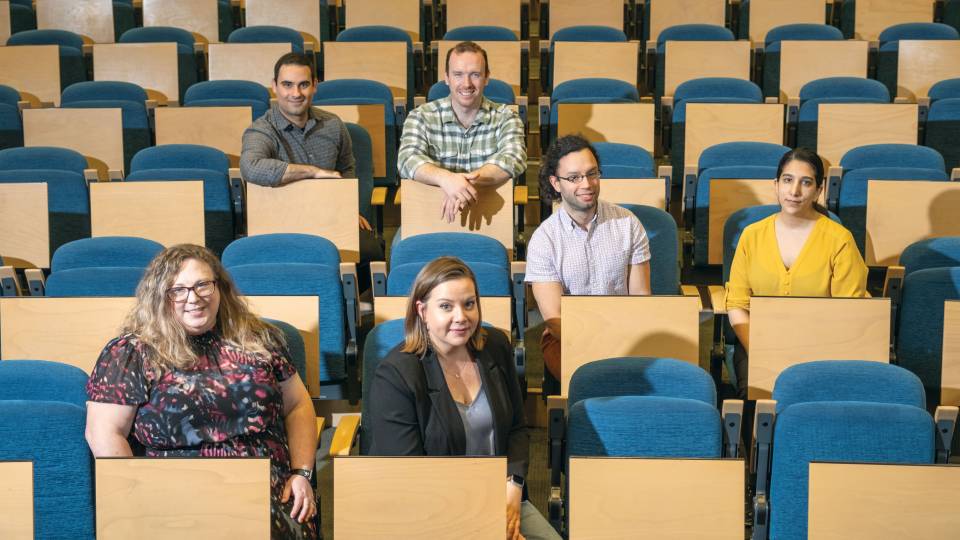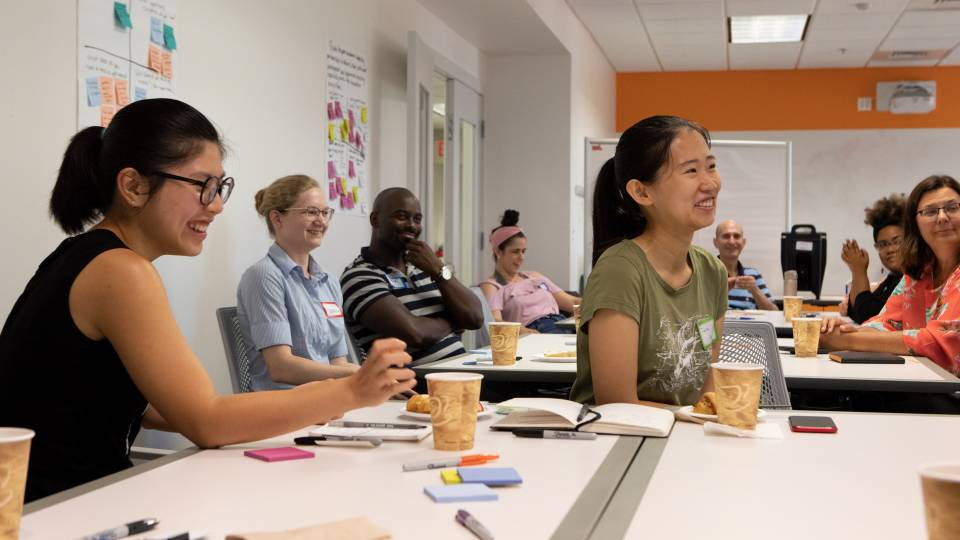From the May 1, 2006, Princeton Weekly Bulletin
Conflict is a normal part of life that can be difficult and distressing, but ultimately can lead to positive changes if handled properly.
That is the message Camilo Azcarate has been imparting to members of the campus community since becoming the University’s ombuds officer in August 2003. Azcarate has worked with several campus offices on conflict management training programs, which have been so well received that his office is now offering courses on the subject to all faculty, staff and students.
“Conflict management is a way of approaching a natural phenomenon that has a positive side — an enormous potential to produce change — and a negative side, which can be quite destructive,” Azcarate said. “Mismanaged conflict has direct and indirect costs. It decreases productivity, increases problems with morale and increases liability.”
“Sometimes when people hear that we help in managing conflict, they think our role is to suppress conflict or to get rid of conflict,” he said. “First of all, it can’t be suppressed. Secondly, it’s not good to do so because conflict has a very positive aspect that you need to use if you want to grow as a person and as an organization.”
The courses are part of a range of services provided by the ombuds office, which is a neutral resource for assistance to any campus community members who have concerns, complaints or other issues regarding their work or studies. It offers confidential consultations and can help develop solutions to problems through mediation, individual coaching, group facilitation or training, or referrals to other University services.
The ombuds office also identifies trends through its interactions with campus community members and, while retaining confidentiality, provides suggestions to appropriate offices on how to avoid possible problems. The ombuds office, which reports directly to the provost, serves as an independent complement to human resources, general counsel, dean’s offices and others that deal with workplace issues and other sensitive matters.
At the core of its mission is helping the University as a whole better manage conflict, which Azcarate views as “a skill that people cannot afford to do badly.”
Azcarate has been developing his conflict management program for nearly a decade. Before coming to Princeton, he worked for Florida Gulf Coast University as an ombuds officer, faculty member and director of the Conflict Resolution Institute in its College of Business. He previously served as government programs coordinator in the Massachusetts Office of Dispute Resolution, where he mediated and facilitated public policy discussions.
Azcarate leads the training with Nicholas Diehl, associate ombuds officer, who previously worked in the ombuds office at Pace University and served as a court mediator in New York City.
Azcarate and Diehl have conducted conflict management training sessions with several offices and departments, including University Health Services, the Office of Information Technology, University Services, the library and facilities. Based on the positive feedback from those sessions, they began offering open-enrollment courses last summer.
The classes have been fully subscribed, mostly by staff and some faculty, and the organizers hope a wider range of campus community members will take advantage of the training. The course also has been included as part of a curriculum of learning and development classes for managers and employees across the campus, which was introduced this year by human resources.
Opportunities for growth
The courses consist of two three-hour sessions, with a maximum enrollment of 20. Participants are given a review of conflict management theories developed over the last 50 years — a blend of social psychology, economics and anthropology — and engage in role playing to practice effective techniques. The training focuses on “active listening” and problem solving to turn conflicts into opportunities for growth and change instead of allowing them to fester into dysfunctional, unproductive relationships.
In a recent session, Diehl played the role of a Princeton employee who does volunteer work for a group that has asked him to organize a career fair. While he recognized the strain this project would put on his own work time and on his co-workers, he felt that the task was in line with the University’s emphasis on service and should be accommodated.
Each participant portrayed Diehl’s supervisor, taking turns discussing the issue with him. In one exchange, when a supervisor noted that his work time was most important, Diehl became more contentious, saying his bosses and co-workers should appreciate the value of his volunteer work.
Azcarate interjected frequently to remind the supervisors to paraphrase and repeat what the employee was saying as evidence that they were listening and that they understood his position, before asking more questions or trying to impose a solution too early in the conversation.
“You would rather wait until he comes up with a solution of his own?” asked one participant, sounding exasperated.
“He may,” Azcarate said. “That’s what problem solving is.” While the supervisor in this situation might feel more urgency to cut the discussion short, it is critical to give the employee his say and let him know the issue is being fully considered, Azcarate noted.
Ultimately, the group explored a variety of possible solutions, including dedicating an hour during the workday when the employee could make calls related to his volunteer project as long as he made up the time later. The exercise emphasized that even if no solution could be reached to accommodate the volunteer project, the employee would know his concerns were heard in a fair and open discussion.
“You have to give people the opportunity to practice skills that are difficult,” Azcarate said of the training. “It’s about realizing that conflict is part of your life, and that the way you manage it is going to determine your success or failure. That’s especially important if you’re responsible for an office climate, because conflict management and decision-making styles determine climate. It is a skill that is preventive and also addresses problems when they happen.”
Changing mindsets
Mary Ann Arone, an operations coordinator in health services, said she has seen an improvement in her communications skills since taking the course in February.
“I felt I needed to learn how to deal with people better, and I’m finding that going to the course helped,” Arone said. “You really have to change your mindset when you deal with people as a supervisor.”
“Repeating what a person said, like they told us, really helps because the person realizes you are listening — rather than just saying, ‘I understand,’” she said. “I’ve learned to listen better. I was under the impression that I was listening, but when I got done with the course I felt that maybe I really wasn’t doing it as well as I should have been. The more you do it, the easier it is.”
Arone said she didn’t know any of her fellow participants, who were from a variety of offices around campus, but she was reassured to learn that they were dealing with similar issues.
“I told quite a few people that I would recommend the class. I thought it was excellent,” she said.
Last summer, Azcarate and Diehl led conflict management training sessions for some 50 employees of University Services, including managers, line staff and operations assistants.
“What was most effective was that we all did it together,” said Paul Breitman, general manager for University Services. “There was a bonding effect and also, as a result, we had a greater sensitivity for each other and what we were trying to accomplish as a group — recognizing the interdependence of each of us regardless of the positions that we have.”
Breitman recalled that he was paired with Theodore Christie, foreman of the maintenance assistants at the Frist Campus Center, during the role-playing exercises. Breitman was a disgruntled employee and Christie played his boss.
“I think it was really insightful. I was being particularly difficult, and Teddy, who is just becoming a manager, said afterward, ‘This is hard. I never realized how hard this is,’” Breitman said. “We had a lot of fun with it and laughed at ourselves. I think it makes people more comfortable in the workplace together.”
Breitman said that he is encouraging new employees to attend the conflict management courses and may bring Azcarate and Diehl back for the department’s next staff retreat.
Diehl said that watching participants in these sessions overcome their inhibitions and make progress toward better conflict management has been rewarding.
“A lot of the people at the beginning would say, ‘I just can’t do this,’ but as they got into it they were the best actors, the most animated and the most excited to be there,” he said. “It’s fun to see that transformation.”
Building on the skills taught in the conflict management courses, the ombuds office also has begun offering open-enrollment courses in mediation, facilitation and negotiation. The office already has worked with organizations and individuals around campus to develop skills in these areas.
Azcarate and Diehl have trained a volunteer panel of 10 staff members from various departments who occasionally assist in mediation sessions. They also have worked with groups including the Undergraduate Life Committee of the Undergraduate Student Government and the Pace Center on facilitation skills to improve group decision-making.
In October 2004, Azcarate and Diehl trained 10 undergraduates as peer mediators under a new program for the residential colleges instituted by the college masters and the Office of the Dean of Undergraduate Students. Weston Powell, a senior who serves as a peer mediator for Mathey College, said he was able to use that training to mediate a roommate dispute that had gone unresolved for two or three months before he was called.
“The main points we focused on in the training were how to disassociate your opinion from the mediation. When hearing something you have an automatic judgment, but you remove that from how you respond,” he said. “A lot of the techniques we talked about in facilitating the mediation were paraphrasing and restating problems in neutral terms that both people could relate to. We talked about how to pull out the central issue to focus on the deeper conflict and how to solve it.”
“The training was a lot of fun. You could tell they had lots of experience and had actually used these techniques, which was reassuring because this was brand new to us,” Powell said. “It was a new way of thinking about it, so it made it exciting.”


